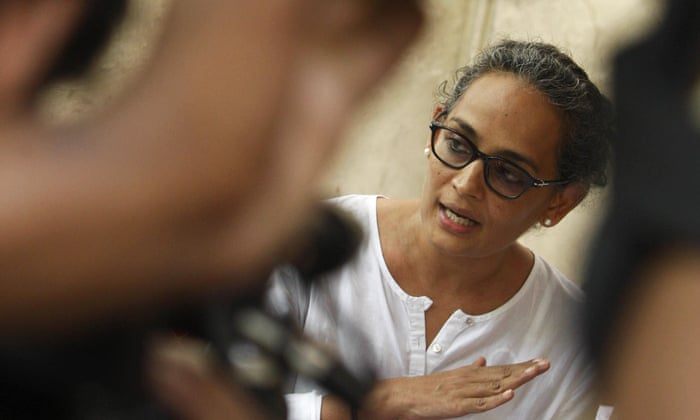
Novelist Arundhati Roy has become the latest literary figure
to return a top Indian national award in protest against the growing violence
and “horrific murders” by rightwing groups in India.
Roy and two dozen Bollywood figures
have added their voices to those of artists, scientists and historians in
expressing alarm at a series of violent incidents and attacks on intellectuals,
following the landslide election victory of the Hindu nationalist Bharatiya
Janata party (BJP) in India last year.
The writer, famous for her Booker
prize-winning novel, The God of Small Things,said she
was returning her 1989 National Award for Best Screenplay in protest against
the growing culture of fear and censorship fostered by the government, who
encouraged the “lynching, shooting, burning and mass murder of fellow human
beings”.
In a sharply worded editorial
in the Indian Express, Roy wrote that millions of people from
minorities – including Muslims, Christians and members of low-caste or tribal
communities – were “being forced to live in terror, unsure of when and from
where the assault will come”.
Over the past two months, more than 40 novelists, essayists,
playwrights and poets have now given back awards from the country’s most
prestigious literary institution, the Sahitya Akademi. In particular, they have
criticised the institution for not condemning the killings of secular
activists.
The two incidents that have most angered India’s intellectuals
and creatives were the murder of Malleshappa Kalburgi, an award-winning scholar
whose frequent criticism of what he saw as superstition and false beliefs had
angered Hindu extremists, and the lynching of a Muslim
labourer in September, who was
believed to have eaten beef. Among India’s majority Hindu population, cows are
considered to be sacred.
The film-maker Sanjay Kak, who was among 24 industry figures and
film-makers returning National Film Awards in Mumbai on Thursday, said those
protesting had “deployed their visibility – and credibility – to articulate the
growing anxiety of a vast number of Indians, those who may remain less visible
but are no less perturbed at what is going on around them”.
Roy said she was “so ashamed of what is going on in this
country”, and was pleased to return her 1989 screenplay award and “be a part of
the political movement”.
“I believe what artists and intellectuals are doing right now is
unprecedented, and does not have a historical parallel. It is politics by other
means,” said Roy, who in recent years has become a civil rights activist.
Many of those protesting have also criticised the prime
minister,Narendra Modi, and
the BJP for not speaking out against religious attacks, saying their silence
has encouraged Hindu hardliners to justify the attacks and assert Hindu
superiority.
Salman Rushdie was also among the authors who recently weighed
into the debate, telling a local television network: “What has crept into
Indian life now is a degree of thuggish violence which is new. And it seems to
be given permission by the silence of official bodies, the silence of the
Sahitya Akademi … by the silence of the prime minister’s office.”
Communal violence and prejudice are nothing new for India.
Hindu-Muslim violence claimed an estimated 1 million lives in the runup to
partition in 1947. Since then, deadly riots and clashes have erupted at
intervals, mostly between Hindus and Muslims, with upsurges of sectarian
tension in recent years often coinciding with elections.
Some people voiced concern over Modi’s meteoric rise and
landslide election victory last year, warning that his support was grounded in
the BJP’s Hindu majority and noting that he had risen to prominence through the
militant Hindu organisation Rashtriya Swayamsevak Sangh, which translates as
the National Volunteers Association.
Modi insisted during his election campaign that he would be
prime minister for all of India and guaranteed protection for minorities. He
has said little on the subject since taking office.
His administration has dismissed the growing protest as a
political ploy to tear down the governing party.
“The entire purpose of these protests is to derail the
development agenda of the Narendra Modi government,” the urban development
minister, Venkaiah Naidu, said on Thursday. “The country is being subjected to
damage and unnecessarily wrong information is being given about political
intolerance.”
On Thursday, a separate group of writers, academics and artists
came out in support of that stance and accused their protesting colleagues of
political vengeance after Modi’s BJP election victory last year.
“A section of the nation’s intelligentsia has expressed outrage
at a perceived mounting intolerance in society,” said a statement signed by 36
Modi supporters, including the head of the Indian Council for Cultural
Relations. “Failure in the elections is now sought to be avenged by other
means.”

ಕಾಮೆಂಟ್ಗಳಿಲ್ಲ:
ಕಾಮೆಂಟ್ ಪೋಸ್ಟ್ ಮಾಡಿ